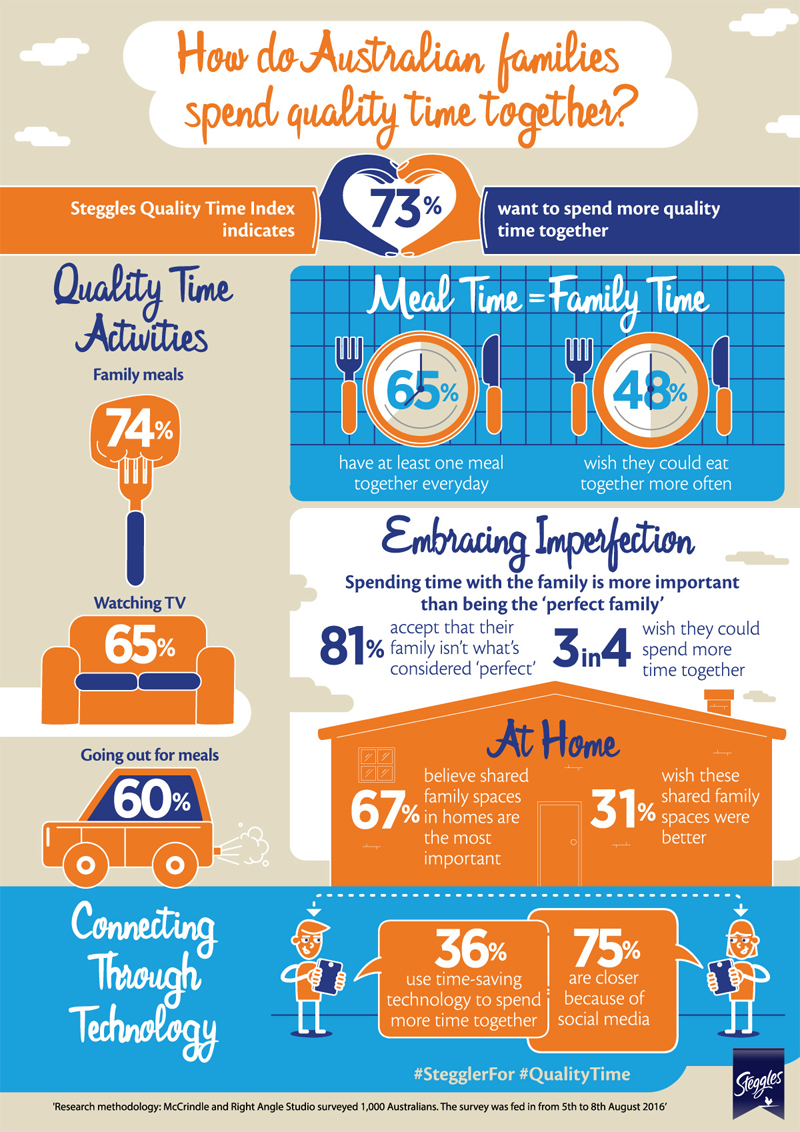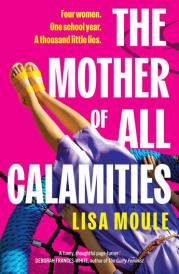Barrie Barton The Steggles Quality Time Index Interview

Barrie Barton The Steggles Quality Time Index Interview
The Steggles Quality Time Index Key Findings
Australian Families
Australian families are changing. Household types are becoming more and more varied and the definition of family is being transformed and influenced by societal shifts. Although household and family types in Australia are changing, most Australians (89%) consider their own family to be normal. Australian families also tend to be accepting of the fact that their families are not perfect and 81% expect that they will fail to be perfect at least some of the time.
Although many Australians still classify the typical family as a -couple with multiple children,' almost as many believe that there is no such thing as a typical family. Almost all Australians indicate that what they believe to be the important outcomes of being a part of a family (such as being loved and having a sense of safety) can also be found to the same degree in non-traditional households/families.
Quality Time
Most Australians (73%) wish they could spend more quality time with their families. While 32% of Australians feel that they definitely spend enough quality time with their family/household, 2 in 5 (42%) are less sure and a further 26% feel that they do not spend enough quality time with their families. Some of the main barriers to spending quality time together, for Australian families, are busyness with work, school or other commitments (46%) and their schedules not matching up (40%). Although more than one in three (34%) Australian families make room for quality time by planning holidays, others try to make space for their families in the everyday. For this reason, eating meals together is one of the most important ways in which Australians are able to spend quality time with their family.
 Food
Food
Almost half (48%) of Australian families wish that their household had more meals together. While many Australians (65%) sit down to eat a meal with their family at least once a day, more than one in five (21%) Australians only share a meal with their family once a week or less. Most Australians (75%) enjoy preparing meals for others in their household and more than half (69%) are appreciative when someone else cooks. When sharing meals together, Australians are most likely to value the quality of the time spent together rather than the quality of the meal, or the effort put in.
Family dinners are most often defined by Australian families as a home-cooked meal eaten together at home. Most Australians suggest that for a meal to be considered a family dinner, it must include a main meal and should go for at least 30 minutes, if not more. Australian families continue to value the idea of a home cooked meal shared together.
Technology
Technology and social media are helping Australian families stay connected and spend more quality time together. Nearly half of Australians (44%) suggest that social media has not affected their family's quality time and a further 31% believe social media has actually brought them closer together. Technology is aiding Australian families as they overcome barriers to spend quality time together. For example, a quarter of Australian families (25%) use social media to stay in touch with family members who are not living with them, to include them in their conversations.
Design
Household spaces are influential in enabling families to create quality time together. Most Australians (67%) feel that communal spaces (living room, dining room and kitchen) are the most important rooms in the home. Almost one in three Australians (31%) wish their kitchen or dining room was better, further indicating that the spaces in the home where meals are prepared for others and shared together, are the most important to Australian families.
Australian Families
Australian families are changing. Household types are becoming more and more varied and the definition of family is being transformed and influenced by societal shifts. Although household and family types in Australia are changing, most Australians (89%) consider their own family to be normal. Australian families also tend to be accepting of the fact that their families are not perfect and 81% expect that they will fail to be perfect at least some of the time.
Although many Australians still classify the typical family as a -couple with multiple children,' almost as many believe that there is no such thing as a typical family. Almost all Australians indicate that what they believe to be the important outcomes of being a part of a family (such as being loved and having a sense of safety) can also be found to the same degree in non-traditional households/families.
Quality Time
Most Australians (73%) wish they could spend more quality time with their families. While 32% of Australians feel that they definitely spend enough quality time with their family/household, 2 in 5 (42%) are less sure and a further 26% feel that they do not spend enough quality time with their families. Some of the main barriers to spending quality time together, for Australian families, are busyness with work, school or other commitments (46%) and their schedules not matching up (40%). Although more than one in three (34%) Australian families make room for quality time by planning holidays, others try to make space for their families in the everyday. For this reason, eating meals together is one of the most important ways in which Australians are able to spend quality time with their family.
 Food
Food Almost half (48%) of Australian families wish that their household had more meals together. While many Australians (65%) sit down to eat a meal with their family at least once a day, more than one in five (21%) Australians only share a meal with their family once a week or less. Most Australians (75%) enjoy preparing meals for others in their household and more than half (69%) are appreciative when someone else cooks. When sharing meals together, Australians are most likely to value the quality of the time spent together rather than the quality of the meal, or the effort put in.
Family dinners are most often defined by Australian families as a home-cooked meal eaten together at home. Most Australians suggest that for a meal to be considered a family dinner, it must include a main meal and should go for at least 30 minutes, if not more. Australian families continue to value the idea of a home cooked meal shared together.
Technology
Technology and social media are helping Australian families stay connected and spend more quality time together. Nearly half of Australians (44%) suggest that social media has not affected their family's quality time and a further 31% believe social media has actually brought them closer together. Technology is aiding Australian families as they overcome barriers to spend quality time together. For example, a quarter of Australian families (25%) use social media to stay in touch with family members who are not living with them, to include them in their conversations.
Design
Household spaces are influential in enabling families to create quality time together. Most Australians (67%) feel that communal spaces (living room, dining room and kitchen) are the most important rooms in the home. Almost one in three Australians (31%) wish their kitchen or dining room was better, further indicating that the spaces in the home where meals are prepared for others and shared together, are the most important to Australian families.
Interview with Barrie Barton from Right Angle Studio
Question: Can you share with us some of the findings from The Steggles Quality Time Index research?
Barrie Barton: The Quality Time Index surveyed 1,000 Australian families with over 50 questions so there were lots of findings. Perhaps it's better if I share my personal favourite: The first and probably most important fact we discovered through the research is that even though nearly a third of Australian families feel social or media pressure to be perfect, the vast majority of us (86%) recognise that family life is seldom perfect and we are totally OK with that. To me that means if the kids are late to school or the dinner is late on the table you needn't crucify yourself – it happens to all of us.
Question: What surprised you most about the results of The Steggles Quality Time Index research?
Barrie Barton: I was most surprised that 75% of Australian families believe that social media either hasn't affected their quality time or it has brought them close together. Younger families tend to use things like Facebook as a tool for organising time together in the real world.
Question: Is there such thing as a -perfect family'?
Barrie Barton: Perfect is a pretty subjective notion when it comes to families. The trouble is that sometimes our peers, or that annoying fancy neighbour, make us feel like being imperfect is a failure which it's not. Life is tricky and full of mess, so what's more important than perfection is trying to be better together.
Question: Why is family time most important, at Christmas?
Barrie Barton: Even if you're not religious, Christmas means holiday and holiday means more time together. In our busy working lives there is less and less opportunity for quality time spent with our families but for two weeks we get that chance and it's important to make the most of it. Apart from presents, the best thing we get at Christmas is a greater sense of what's going on in the lives of the people that matter to us.
Question: How can families spend more quality time together - especially leading into Christmas?
Barrie Barton: Unless you are talking to loved ones overseas, spend a little less time with your gadgets. They are good for organising quality time but they don't qualify as quality time. I'd also suggest making more of meals; involve people in the preparation and cleaning as well as eating. Food seems to taste better when its the labour of many.
Question: How has social media closed a family gap?
Barrie Barton: Whether it has or not is up for debate but what we can tell you is that the younger the family the more social media will be a part of how it coordinates schedules and keeps people informed about what's going on. Social media is like any other system in life - you need to understand how it works, where it's good, how it's bad… and then ultimately use it in a way that is controlled rather than letting it use you.
Interview by Brooke Hunter
Barrie Barton: The Quality Time Index surveyed 1,000 Australian families with over 50 questions so there were lots of findings. Perhaps it's better if I share my personal favourite: The first and probably most important fact we discovered through the research is that even though nearly a third of Australian families feel social or media pressure to be perfect, the vast majority of us (86%) recognise that family life is seldom perfect and we are totally OK with that. To me that means if the kids are late to school or the dinner is late on the table you needn't crucify yourself – it happens to all of us.
Question: What surprised you most about the results of The Steggles Quality Time Index research?
Barrie Barton: I was most surprised that 75% of Australian families believe that social media either hasn't affected their quality time or it has brought them close together. Younger families tend to use things like Facebook as a tool for organising time together in the real world.
Question: Is there such thing as a -perfect family'?
Barrie Barton: Perfect is a pretty subjective notion when it comes to families. The trouble is that sometimes our peers, or that annoying fancy neighbour, make us feel like being imperfect is a failure which it's not. Life is tricky and full of mess, so what's more important than perfection is trying to be better together.
Question: Why is family time most important, at Christmas?
Barrie Barton: Even if you're not religious, Christmas means holiday and holiday means more time together. In our busy working lives there is less and less opportunity for quality time spent with our families but for two weeks we get that chance and it's important to make the most of it. Apart from presents, the best thing we get at Christmas is a greater sense of what's going on in the lives of the people that matter to us.
Question: How can families spend more quality time together - especially leading into Christmas?
Barrie Barton: Unless you are talking to loved ones overseas, spend a little less time with your gadgets. They are good for organising quality time but they don't qualify as quality time. I'd also suggest making more of meals; involve people in the preparation and cleaning as well as eating. Food seems to taste better when its the labour of many.
Question: How has social media closed a family gap?
Barrie Barton: Whether it has or not is up for debate but what we can tell you is that the younger the family the more social media will be a part of how it coordinates schedules and keeps people informed about what's going on. Social media is like any other system in life - you need to understand how it works, where it's good, how it's bad… and then ultimately use it in a way that is controlled rather than letting it use you.
Interview by Brooke Hunter
MORE



